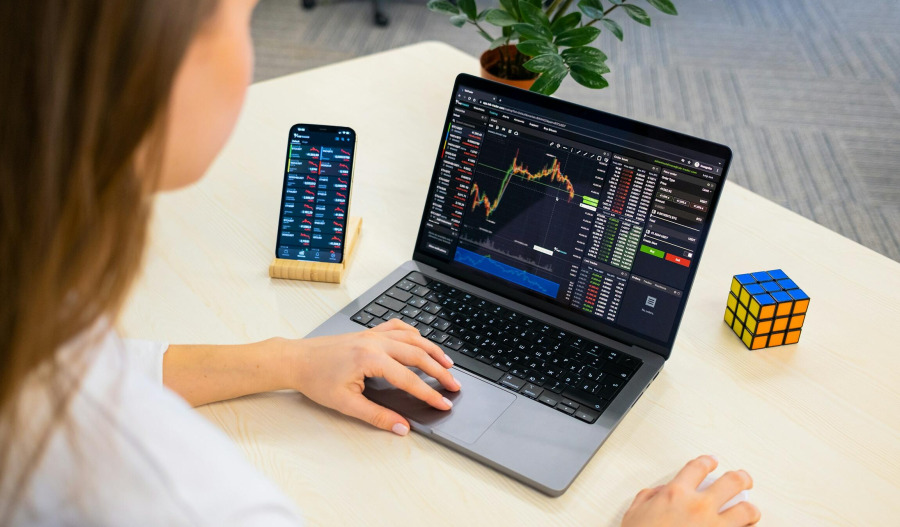Markets churned through another week where the tech revolution's grand promises met the harsh reality of actual earnings reports, while global leaders discovered that diplomacy can't stop missiles from flying.
Corporate Australia got a painful reminder that past mistakes have present-day price tags, as billion-dollar mining deals and surprise meme stock comebacks kept traders, executives, and yet another failure gets more Jeeps recalled for carmaker Stellantis.
Apple unveils thinner iPhone
The AI revolution continued minting fresh billionaires at breakneck speed, with analysts counting 59 new tech titans joining the ten-figure club this year alone.
Goldman Sachs projects global investment in machine intelligence could rocket to $200 billion by 2025, potentially turbocharging GDP by 7% over the next decade.
Yet beneath the euphoria lurks a sobering counternarrative as Apple's highly anticipated product launch showcased the thinnest iPhone yet.
The 5.6mm iPhone Air made from "spacecraft titanium" glossed over the intelligence advancements investors desperately wanted to hear about.
This leaves the company trailing Google, Samsung and Microsoft in the computational arms race.
Oracle provided the week's standout performance, with shares surging 26.8% after projecting Cloud Infrastructure revenue would grow 77% to US$18 billion in 2026.
CEO Safra Catz called it an "astonishing quarter", driven by multi-billion-dollar contracts that pushed remaining performance obligations to $455 billion.
Meanwhile, cloud infrastructure specialist Nebius rocketed 60% on a $19.4 billion Microsoft deal over five years.
Frugal business
Australian retailers discovered this week that historical wage violations carry expensive consequences.
Coles faces potential costs of A$150-250 million following a Federal Court decision on underpayments to salaried managers.
This adds to the $31 million already paid in remediation after conducting reviews since 2020.
Big Four banks weren't immune from restructuring fever as ANZ announced plans to axe 3,500 employees under new CEO Nuno Matos.
This represents 8% of its global workforce in a $560 million restructuring aimed at eliminating duplication and complexity.
Critics questioned whether stopping work entirely constituted a viable strategy.
Corporate America faced its own compliance challenges as Tylenol maker Kenvue plunged 19% on reports that Health Secretary Robert F. Kennedy Jr. plans to link the drug to autism in pregnant women.
The company maintains there's no causal link, however hundreds of lawsuits remain pending against the pharmaceutical giant.
Manufacturing disruptions…
International trade tensions reshaped manufacturing landscapes across continents as European carmaker Stellantis issued another major recall for 91,787 Jeep Grand Cherokee plug-in hybrids.
Software malfunctions could cause sudden power loss, adding to mounting quality concerns under new CEO Antonio Filosa.
The company posted a devastating €2.3 billion net loss for the first half of 2025.
Meanwhile, immigration agents raided a Hyundai battery plant in Georgia, detaining 475 workers - mostly South Korean nationals.
This represented one of the largest single-site enforcement operations ever conducted as South Korea dispatched diplomats and planned charter planes to repatriate 300 workers.
The targeted plant's opening was delayed, underscoring how immigration enforcement intersects with clean energy infrastructure development.
…cause geopolitical escalations
Trump's threatened "phase two" sanctions against Russia gained urgency after Moscow launched its largest air attack of the entire war.
The assault deployed over 800 drones and struck government buildings in Kyiv for the first time, killing at least four people, including a baby.
The escalation underscored limitations of diplomatic pressure when military objectives remain unchanged.
Trump's frustration with his inability to broker peace negotiations has become increasingly evident, particularly as energy markets continue absorbing economic fallout from the extended conflict.
Traditional allies faced political upheavals as Japan's PM Shigeru Ishiba resigned after his Liberal Democratic Party lost its majority.
He waited for tariff talks with the US to conclude before stepping down.
France appointed its third Prime Minister in one year, as Israeli forces bombed Doha in attacks on Hamas leaders.
Poland said it shot down suspected Russian drones, and European envoys travelled to Washington for sanction talks.
Labour markets flash warning signals
The U.S. employment landscape continued deteriorating in August, with just 22,000 non-farm jobs added compared to 79,000 in July.
Unemployment increased to 4.3%, its highest level since 2021, prompting further speculation about Federal Reserve rate cuts.
American confidence in finding new employment declined, as job revisions revealed the economy added a whopping 911,000 fewer positions than initially reported in the year to March.
A judge blocked Trump from firing Fed Governor Lisa Cook, as the Supreme Court ended curbs on immigration raids.
Trade wars intensify economic pressures
Trade tensions escalated across multiple fronts as the EU fined Google €2.95 billion for anti-competitive advertising practices.
This prompted Trump to threaten trade penalties and potential tariffs under Section 301 proceedings.
He then expanded steel tariffs across 407 products and told the EU to impose tariffs on India and China over Russian oil purchases. The U.S. faces a $1 trillion refund risk if tariffs are overturned by courts.
Producer inflation in the U.S. dropped 0.1% in August, consumer inflation ticked up 0.4%, and mortgage demand rose as loan rates fell to a housing market that just reached $55.1 trillion in value.
Offshore wind projects teeter on the verge of collapse under policy uncertainty, a prime example of how trade disputes create ripple effects everywhere.
Mining sector reshuffles the deck
The week's most significant transaction saw Anglo American and Teck merge in a $53 billion deal - the mining sector's second-largest acquisition ever.
The newly formed Anglo Teck will be headquartered in Canada with Anglo shareholders owning 62.4%, creating the world's fifth-largest copper producer.
It's been touted as a defensive chess move after BHP's failed takeover attempt last year.
Mining giants Glencore and BHP are reportedly considering disruptive counter-bids, though any rival offer would trigger a costly $330 million break fee.
Barrick farewelled Canadian gold for a red metal future, and CATL's Jianxiawo mine restart sparked lithium market reversals.
Mission-critical computational intelligence is driving Australia's mining future as companies seek efficiency gains through technological integration.
Interest rate sentiments
Australian consumer confidence offered contradictions as Westpac's sentiment index slipped 3.1% to 95.4 in September.
This returned readings to "cautiously pessimistic" territory despite improving family finances and recent RBA rate cuts to 3.6%.
The divergence between household-level optimism and broader economic pessimism reflects complex dynamics facing consumers.
Personal financial positions show improvement, but concerns about economic outlook remain elevated, particularly regarding employment prospects.
Meanwhile, U.S. markets refreshed records despite mixed economic signals.
Kicking goals
Beyond the major restructurings, corporate earnings kicked off once again with GameStop posting a turnaround with 22% revenue growth driven by its collectables pivot.
Collectables now comprise 25% of sales as the original meme stock reported its fifth straight quarterly profit, demonstrating how strategic shifts can revitalise struggling retail operations.
CBA enjoyed big paydays from Klarna's IPO, with shares jumping 30% on NYSE debut, valuing the Swedish buy-now-pay-later company at US$19.65 billion.
Australia's largest bank's A$350 million investment stake was valued at $1.2 billion, Australia Post resumed shipping to the US after suspension, and AFL clubs kicked membership records across the competition.
Adobe shares rose on revenue beats across segments, demonstrating how established technology companies continue finding growth despite increased competition from newer market entrants.
Investment flows revealed that the NASDAQ invested in crypto exchange Gemini before its IPO, while AeroVironment's Q1 results saw its stock rise in late trade as super funds continued smooth starts to the new year.
Bond flash estate planning focused on investment bonds as digital costs drove retirement income needs higher.
Beyond ANZ's major cuts, other companies announced workforce changes as Novo Nordisk plans reductions amid Eli Lilly competition in the diabetes drug market.
Succession
Media dynasties finalised succession plans as the Murdochs settled succession disputes in a $3.3 billion deal.
Lachlan Murdoch cemented control as siblings James, Elisabeth and Prudence received cash in exchange for relinquishing voting rights.
Rupert Murdoch cleared the heir, securing Lachlan's control through 2050 in a move that resolves years of speculation about the media empire's future leadership structure.
International expansions and healthcare
Global companies pursued growth opportunities with Chipotle announcing its first expansion into Asian markets.
Internet services faced disruption amid Red Sea cable cuts affecting global communications infrastructure.
British engineering highlighted future potential through Rolls-Royce's SMR nuclear tech, which could power its next rally as CEO Tufan Erginbilgic suggested the nuclear business could make it the UK's biggest company.
The world needs 400 small modular reactors by 2050, creating substantial opportunities for companies positioned in next-generation nuclear technologies.
Medical technology has attracted investment as computational medical firm Artrya secured a $75 million capital raise, and traditional healthcare faced scrutiny over drug safety claims.
Social policy initiatives gained momentum as a private member's bill takes aim at gender gaps in superannuation.
Underwater drone fleet plans worth $1.7 billion were unveiled for naval capabilities, demonstrating how defence spending continues supporting technological development across multiple sectors.



